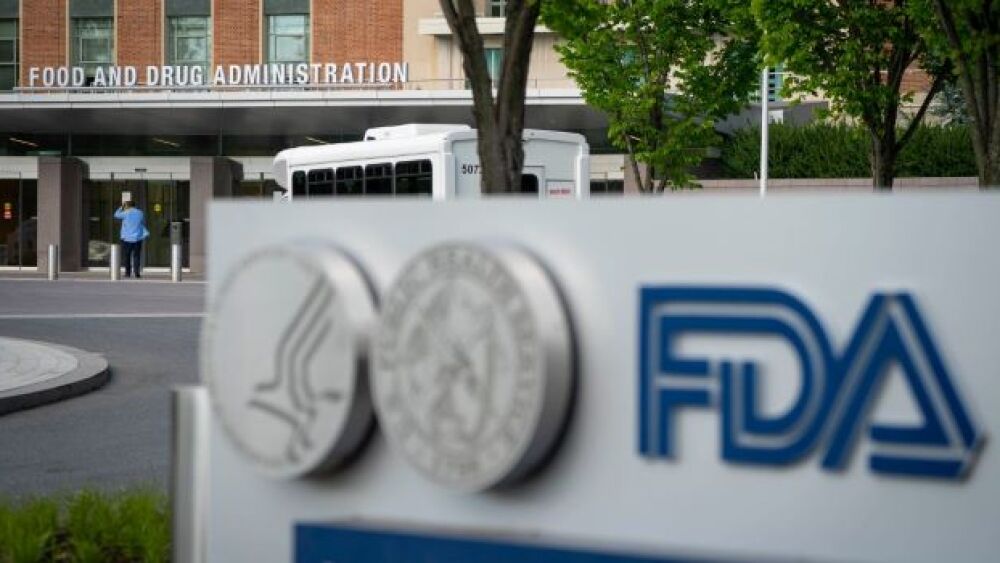After 12 years on the market, the FDA announced it has withdrawn its previous approval for the only drug on the market to prevent preterm birth, Covis Pharma’s Makena.
Pictured: FDA sign in front of building/Courtesy Sarah Silbiger/Getty Images
After 12 years on the market, the FDA announced Thursday it has withdrawn its previous approval for the only drug on the market to prevent preterm birth, Covis Pharma’s Makena.
The withdrawal renders the use and distribution of Makena and its generic versions unlawful, effective immediately. The decision was jointly issued by Robert Califf, FDA Commissioner, and Namandjé Bumpus, the agency’s chief scientist.
According to a March 7 press release, Covis requested a wind down of Makena (hydroxyprogesterone caproate) that would allow current patients to complete their 21-week course of treatment and exhaust the remaining inventory.
This proposal had been set forth before, but, according to Covis’ press release, the FDA’s Center for Drug Evaluation and Research (CDER) did not agree with it. CDER “requested that the proceedings continue until concluded with a decision from the FDA Commissioner and Chief Scientist,” the company said.
In a Friday press release issued in response to the FDA’s decision to withdraw the approval, Covis stated, “CDER recognizes that a limited supply of Makena and generics has already been distributed and acknowledges that some healthcare providers might continue to prescribe or administer that limited remaining supply to their patients. The company recommends that healthcare providers consider FDA’s conclusion on the withdrawal of Makena.”
Covis’ request for a wind down came in response to a three-day hearing in October 2022 that concluded with the FDA’s Obstetrics Reproductive and Urologic Drugs Advisory Committee voting to withdraw Makena’s approval in a 14-1 decision. A post-approval confirmatory study had found that the drug failed to show the clinical benefits of decreasing preterm births and improving infant outcomes.
The decision to withdraw the approval solidifies the advisory committee’s conclusion that the drug was not working as intended. Covis agreed with its conclusion also, stating that it was seeking to voluntarily withdraw the NDA granted to Makena in light of the committee’s recommendations. The company had already outlined its plan for voluntary withdrawal shortly after the 2022 hearing.
In October 2020, the FDA proposed withdrawing the NDA approval of Makena after reviewing data that Covis collected over a nine-year period. The briefing documents that the FDA issued ahead of the 2022 hearing further emphasized the agency’s stance on the issue.
Califf and Bumpus outlined the rationale for the withdrawal in the decision. They said it is based on their review of CDER’s and Covis’ submissions, the 100-plus public comments submitted to the docket on the matter since 2020, the 2022 hearing transcript and the Presiding Officer’s report.
In the document detailing the decision, Califf said that “the touchstone of FDA drug approval is a favorable benefit-risk assessment; without that favorable assessment, the drug should not have the status of being FDA-approved.”
How It Started
The FDA approved Makena via the accelerated approval pathway in 2011, back when the drug was developed by Hologic. AMAG Pharmaceuticals bought the rights to Makena a few years later. In October 2020, Luxembourg-based Covis Group entered a $647 million deal to acquire AMAG, along with the global rights for Makena, approved to reduce the risk of preterm birth in women who had one baby and a history of spontaneous preterm birth.
The end of the saga underscores the concerns that have been raised in recent years with the accelerated approval pathway. Other drugs that have been approved through this pathway include Aduhelm, which prompted an OIG investigation into the pathway in 2022
The FDA said that there is “a crucial need” for treatments to reduce the risks associated with preterm birth.
“It is tragic that the scientific research and medical communities have not yet found a treatment shown to be effective in preventing preterm birth and improving neonatal outcomes—particularly in light of the fact that this serious condition has a disparate impact on communities of color, especially Black women,” Califf said.
The opportunity that exists for other pharma companies in the market to address this patient population is two-pronged, with preterm birth complications being the leading cause of death among children younger than five-years-old and considering the long-term health problems associated with preterm births.
“Nothing in this opinion today is intended to minimize these concerns—to the contrary, our hope is that this decision will help galvanize further research,” Bumpus said.






